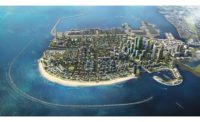The port city will be built on 223 hectares of land, which will be reclaimed from the sea. The first phase of the project involves the construction of hotels, high-rise buildings, a shopping complex, a mini golf course, water-sports and other recreational facilities and a Formula 1 racing track as well as water, electricity and communication facilities. The second phase will include Sri Lanka’s first 100-floor skyscraper.
“A good part of the planned reclamation has been completed. The dredgers and all the other equipment are still on the site. The contractor [will] resume work [at] any time,” an engineer connected with the Colombo Harbor Expansion project, which is next door to the port-city site, told ENR.
There is no official confirmation about how much reclamation work has been done. Construction of dozens of various facilities has been held up because reclamation and landscaping of the project site remains to be completed. The project is mired in controversies. There are reports the contract grants full sovereignty to the contractor over the land and even air space in the sensitive port area in the national capital, Colombo.
Neighboring India is believed to have objected because a strong Chinese presence in the area could make Indian ships vulnerable as they pass close to the area in the Indian Ocean. Some Chinese commentators suspect India may have influenced Sri Lanka’s decision because the work suspension came a day before Prime Minister Narendra Modi visited Colombo.
CCCC has wide experience with large projects, including the Macau International Airport, the Hong Kong International Airport and the Gawadar Deepwater Port in Pakistan. The firm was debarred by the World Bank from a road project in the Philippines in 2009, according to reports.
The project was awarded earlier to a Singapore company, which later pulled out. CCCC came into the picture in 2011 and began work on land reclamation in September of last year.
Continuing with the project is crucial for China for the sake of its $40-billion Silk Road program, which is meant to connect 20 different countries. It also means a lot of work for Chinese contractors, which plan to build ports, bridges, roads and industrial hubs along the vast route that covers south and central Asia and part of Europe.
“Sri Lanka is one of the hubs of the Maritime Silk Road,” Chinese Minister Liu Jianchao said. “We are really happy that the two countries agreed to have further infrastructure projects."
Nevertheless, China fears that Sri Lanka might invite western contractors if it decides to scrap the existing deal with CCCC, sources said. This is particularly worrisome for Beijing because Myanmar, which was once under western sanctions, has embraced investments from the U.S. and Japan in a big way.
China was the only country backing Myanmar’s military junta during the long years of sanctions, but it is now being forced to compete for a share of business.


Post a comment to this article
Report Abusive Comment